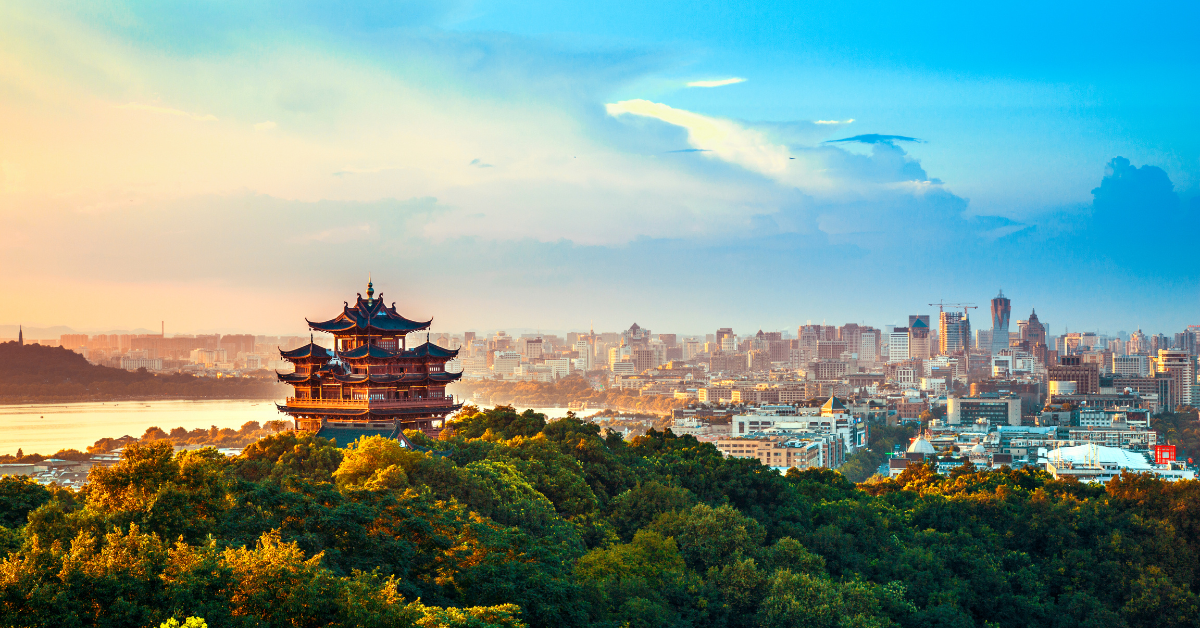Hangzhou, the capital of Zhejiang Province, has long been called “Paradise on Earth.” For the Japanese, its charm extends beyond the scenic beauty of West Lake to include tea culture and literary history. This article introduces the multifaceted images Japanese people hold of Hangzhou.
The First Impression Japanese People Have of Hangzhou
When Japanese hear the name Hangzhou, the first thing that comes to mind is the beautiful scenery of West Lake. In spring, peach and plum blossoms decorate the lakeside; in summer, green trees and lotus flowers cover the water; in autumn, the red leaves reflect on the surface; and in winter, snowy scenery creates a dreamlike atmosphere. These seasonal changes resonate with Japanese aesthetics, reminding many of Kyoto and Nara, Japan’s ancient capitals.
In addition, Hangzhou has long been a cultural center since ancient times. Known as the endpoint of the Silk Road, and often depicted in literature and painting as an Eastern utopia, it has left Japanese people with the impression of a city where “tradition and nature coexist.”
The Charm of Hangzhou’s History and Culture
As the capital during the Song Dynasty, Hangzhou played an important historical role. The poems of Bai Juyi and Su Dongpo praising West Lake were introduced to Japan long ago, shaping the perception of Hangzhou as a utopia among Japanese with an interest in Chinese culture.
Furthermore, Hangzhou’s tea culture is widely known in Japan. Longjing tea, in particular, is highly valued, often compared with Kyoto’s Uji tea. For Japanese visitors, seeing tea plantations or enjoying tea houses provides an experience that symbolizes the true essence of Hangzhou.
Cultural Images of Hangzhou for Japanese People
| What Japanese Associate | Representative Examples of Hangzhou |
|---|---|
| Scenery | West Lake, Broken Bridge, Lingyin Temple |
| Literature | Poems of Su Dongpo, Bai Juyi |
| Tea Culture | Longjing Tea |
| City Image | Paradise on Earth, Ancient Capital |
Hangzhou as a Tourist Destination
For Japanese tourists, Hangzhou is strongly seen as a “city where nature and urban life are in harmony.” Scenic spots such as the Ten Views of West Lake and the Song Dynasty Town theme park are especially popular. Compared with Shanghai and Beijing, Hangzhou is viewed as calmer and more relaxing.
The well-developed tourism infrastructure also gives a sense of security. With modern hotels and an efficient transportation network, Hangzhou is considered a comfortable city for foreign visitors, reinforcing the positive image among Japanese travelers.
Spots in Hangzhou Favored by Japanese Tourists
| Category | Representative Destinations | Features |
|---|---|---|
| Nature | West Lake, Nine Creeks | Seasonal beauty |
| History | Lingyin Temple, Six Harmonies Pagoda | Symbols of ancient Chinese culture |
| Entertainment | Song Dynasty Town, Hangzhou Zoo | Popular for families |
| Shopping | Hefang Street, Wulin Square | Blend of traditional crafts and modern commerce |
Japanese Views of Hangzhou as a Modern City
In addition to its traditional landscapes, Hangzhou has the face of a modern city. With Alibaba at its center, the city has developed into a hub for IT, creating the image of a “high-tech city” and a “city of innovation.”
Among Japanese businesspeople, Hangzhou is increasingly regarded as a city where history and cutting-edge technology merge. It is not only seen as a tourist spot but also as a promising hub for future business opportunities.
Industries in Hangzhou Noted by Japanese People
| Sector | Features | Image Among Japanese |
|---|---|---|
| IT | Alibaba, startups | Center of high technology |
| Tourism | West Lake, tea culture, historic architecture | Treasure of cultural experiences |
| Education | Zhejiang University | Base for study and research |
| Sports | Hosting international events | Asian sports hub |
Hangzhou’s Living Environment as Seen by Japanese People
For Japanese who choose long-term stays or study abroad, Hangzhou is evaluated as a “comfortable city to live in.” Surrounded by lakes and mountains, it offers a peaceful natural environment. Its food culture is diverse and easy for Japanese to adapt to, and living costs are generally lower compared to Beijing or Shanghai.
However, the city’s rapid urbanization has also brought challenges such as traffic congestion and environmental issues. This has led some Japanese to view Hangzhou as a city that is “beautiful but facing modern challenges.”
Hangzhou as a Sports City
Hangzhou also presents itself as a sports city, an aspect that has improved its image among Japanese. In 2023, it hosted the Asian Games, where many Japanese athletes participated and excelled. Around West Lake, people can be seen jogging and cycling, which strengthens the Japanese impression of Hangzhou as a “healthy and active city.”
With facilities for swimming, table tennis, and other sports that China excels in, the city is also becoming recognized as a hub for sports exchange. More Japanese student and corporate teams are coming to Hangzhou for training camps, positioning the city as a place that fosters friendship through sports.
Sports Aspects of Hangzhou Noted by Japanese
| Type | Features | Impression for Japanese |
|---|---|---|
| International Events | Asian Games | Recognition as an international city |
| Leisure | Cycling, jogging | A healthy and active city |
| Facilities | Swimming centers, table tennis arenas | Hub of Chinese sports culture |
| Exchange | Student camps, friendly matches | Promotes Japan-China friendship |
Conclusion
For Japanese people, Hangzhou embodies the scenic beauty of West Lake, the culture of Longjing tea, and the historical background of an ancient capital. At the same time, it reflects modern urban development, IT industry growth, and the advancement of sports culture.
Thus, Hangzhou continues to captivate Japanese hearts as a city where tradition and modernity, culture and sports coexist in harmony.






